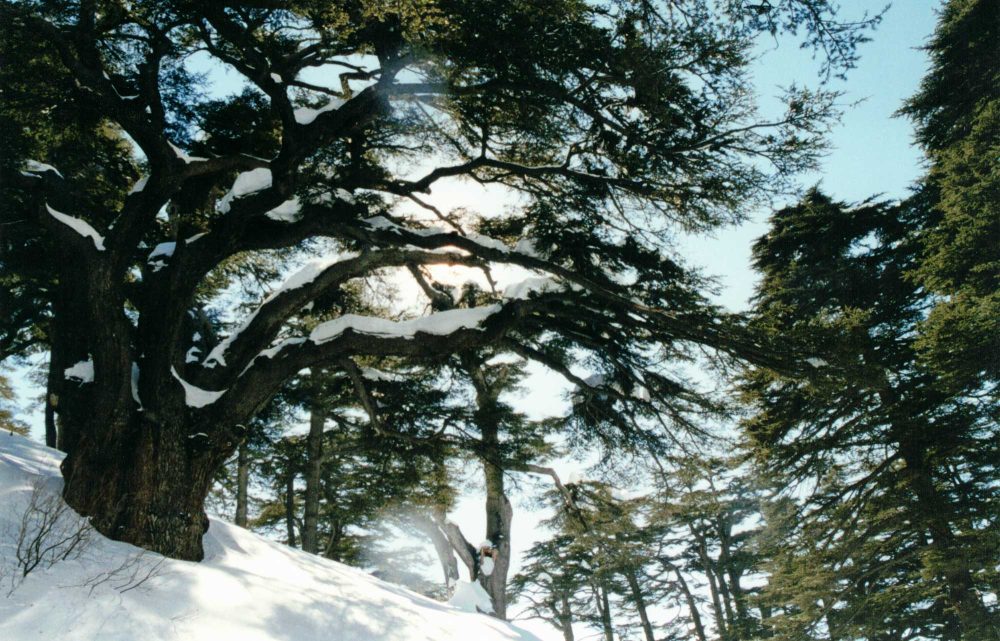
| Skip introduction and take me straight to today's installment. An introduction to American Impressions: I was the luckiest reporter on the planet. I’d proposed to my editors at the Lakeland Ledger to send me across the country and write an essay on each of the 50 states. They went for it, handing me two credit cards, a camera and the vehicle of my choice--a Chevy Venture I rigged up with a library and a bed. 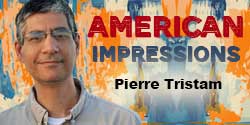 I spent 15 months alone on the road, logging 60,000 miles and four times as many words. The result anchored a weekly section throughout 1999, counting down to the millennium. What you’ll read here between Christmas and the New Year, when FlaglerLive traditionally pulls back on hammering you with hard news (and hammers you instead with pleas to support us), are the first few installments of that journey. While my reporting at the time forms the basis of the work, most of what you’ll read has not been published before. The rest has been extensively reworked and updated. I spent 15 months alone on the road, logging 60,000 miles and four times as many words. The result anchored a weekly section throughout 1999, counting down to the millennium. What you’ll read here between Christmas and the New Year, when FlaglerLive traditionally pulls back on hammering you with hard news (and hammers you instead with pleas to support us), are the first few installments of that journey. While my reporting at the time forms the basis of the work, most of what you’ll read has not been published before. The rest has been extensively reworked and updated. I was not traveling to discover myself or get away from myself, I was not in search of America or of eternal truths. I’m not equipped for that sort of thing, being rather shallow, and I wasn’t going to pretend to understand a state or even a village from a passing week. Nor is this a travelog about food or fun places to visit or quirky people I met along the way. I was just a reporter, picking up stories here and there, choosing for each state one or two themes that struck me as telling about that part of the country, and hoping to build a mosaic of an America every inch a wonder and a puzzle of joys and sorrows to an immigrant hopelessly in love with his adopted country, despite and still. I hope you’ll enjoy the journey. --Pierre Tristam Previous installments:1. Introduction: The Day Before America | 2. Heartland | 3. The Road | 4. Alaska: The New Suburb | 5. Alaska Highway | 6. Montana: Backtracking Lewis and Clark | 7. Montana: Ghost of the Prairie | 8. North Dakota: A Life in Missiles | 9. South Dakota: Crazy |
The Switzerland of the Orient. The Paris of the Middle East. The jewel of the Mediterranean.
The crock of it all.
Lebanon was never the nation it made itself out to be. But it had its share of marketers, racketeers, really, who created a lie smelted out of pretty little illusions: Lebanon the land of tolerance, the intellectual haven, the pluralist oasis. A bit more gall and the mythmakers would have claimed that Christ summered in the Lebanese hills or skied around the Cedars. On April 13, 1975, the lie — my native home, my sweet memory, my once-upon-a-time-in-the-East — unraveled.
Remembering this in the fall of 1998 was unnerving. I didn’t like to think about it. I didn’t need to think about it. I was about to embark by myself on the journey of a lifetime across the 50 states, discovering them and writing about each over 51 weeks in a way most of us immigrants (all of us Americans) only dream of doing some day. Mostly by chance and a newspaper’s indulgence–an unlimited credit card, a van and a year to do with what I wished– my “some day” was here. I wanted to embrace it. Lebanon was a done deal.
And yet it wasn’t, because I could trace everything that I am and everything that I escaped, including escaping being Lebanese or being dead, to that Sunday in 1975.
It went like this: We’d spent the day at our summer home in the mountains with aunts and uncles and cousins, feasting on one of those epic Lebanese meza that demand an afternoon’s stamina and end, for the over-40 set, in a group slump. Our parents’ cigarette clouds and boring talk chased us kids outside. We played Bonanza. The parents napped. They woke up, smoked more cigarettes, then told us to get ready to leave for the city. We protested. They yelled. We relented, and by 7 p.m. we were back in Beirut.
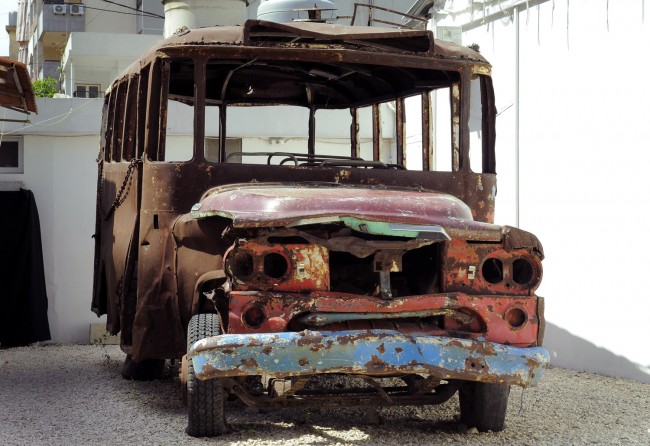
An hour later my cousin Philippe called to spread the news. Somewhere in the city Palestinian guerrillas had ambushed Pierre Gemeyel, a Christian militia patriarch, at a church dedication earlier in the day. He survived. An aide didn’t. Christian militiamen retaliated by ambushing a bus-full of Palestinians and strafing everyone to death, by-standers and the required women and children included. Fighting had broken out between the two sides in a Beirut suburb. Maybe it’d turn out to be just another heave of tire burnings and idle shooting at the sky.
We’d known days like this since 1969, when Lebanon foolishly signed the Cairo Accord. It turned Palestinian refugee camps in Lebanon into autonomous zones within the country and allowed Palestinian guerrillas to militarize and to wage their futile war against Israel from Lebanese soil–not including Yasser Arafat’s Palestine Liberation Organization, not initially: he was actually the relative moderate among warlords. But he was outflanked by breakaway factions that the PLO eventually joined. Either way, the Cairo Accord was like injecting cancer cells in a patient with poor immunity. Since their Phoenician days the Lebanese have always been better at running businesses than countries.
Tensions kept building, especially between Palestinians egging on Muslims on one side and, on the other, Lebanon’s Christian minority, to which I belonged–a minority you could grossly compare to white Southerners of the Jim Crow era: entitled, bigoted, corrupt, their Christianity a form of supremacy they’d lorded over Muslims but were finding increasingly impossible to protect against Palestinians armored in Soviet weaponry, or against increasing public support for the Palestinian cause in reaction to Israeli bombings and raids (44 major Israeli attacks on Lebanese soil between 1968 and 1974). Animosities were fueled by factions itching for a fight amid the incompetence of a Christian-aligned central government, finally exploding into a war we’d been too smug to imagine that Sunday.
We began to hear the shelling during the night as fighting spread, although to me and my two older brothers it only meant we’d be spared school in the morning. The prospect of facing Jesuit teachers was more frightening than incomprehensible sounds outside our windows. That’s how Lebanon’s war with itself began: 15 years of futility that started the week Phnom Penh fell to the Khmer, two weeks and two days before America’s 15-year futility in Vietnam ended. I was barely 10, not a bad time for a childhood to end but not a particularly good way to end it.
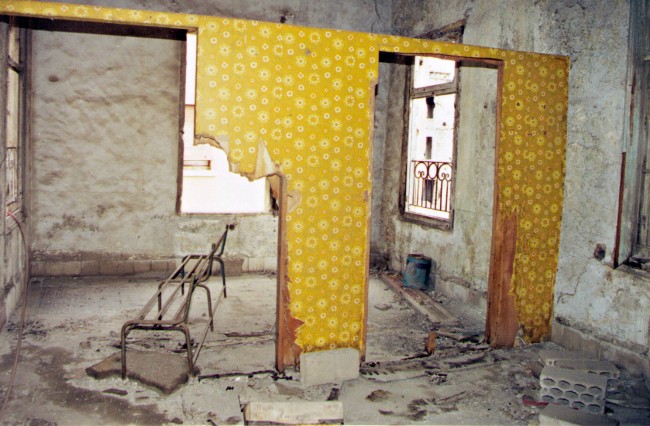
I periodically look up news coverage of those early days in the Times Machine, guiltily counting my blessings that I somehow made it out. Those Beirut datelines of night battles, sniper fire, kidnappings, beheadings, were to frame the lives and deaths of a generation and haunt my nightmares, still today. Lebanon made the front page of The Times the Monday after the bus-strafing, and again two days later when the death toll reached 100. It would reach 50,000 by the time I left, 150,000 by 1990. Like a prophecy in newsprint, I could see the entire 15-year history of the war, my history, anyway, in those two articles, even in a single line: “The sound of guns reverberated through the dark and deserted streets while families huddled in their homes.”
We were those families, we were those huddlers, and those sounds — that thud of
not-so distant rocket-fire, that double whip-crack of sniper bullets, that aimless rat-at-at-at-at of 16-year-old militiamen suddenly gorging themselves on live ammo and the obscenity of their AK-47’s — those sounds still reverberate in my ears, a constant reminder of the lie that Lebanon proved to be, of “the vile parody of home,” as Vladimir Nabokov once called his ex-land.
As an ex-Lebanese I’d often be asked to explain “that mess over there,” as if it were an untidy room in the world’s house. The only answer that seemed to me justified is the answer the war dead would give: Who cares? Lebanese Christians, Muslims, Palestinians, Israelis, Syrians, each a hydra of factions and subfactions that tore at each other or among themselves. There were no white knights. They all made a bombing range of the land’s supposed holiness and cheapened human life in the name of a God or an Allah or a star of David, a grove’s boundary or the different pronunciation of a last name enough to turn two Semites into genocidal enemies before they’d join forces and turn on the next tribe. My memories of the old country were once rich with that “scent of Lebanon” Solomon sings about. They now stink of that Sunday. I didn’t know it yet but the unquestioned faith in God I’d been raised with died that day, seeding a revulsion for religion that persists, often unfairly, even as I write this.
*
A year later my father was dead, claimed not by the war, not directly, anyway, but by the sort of heart attack that doesn’t strike a 46-year-old man without accomplices — anxiety, broken dreams, the ruin of his photography business. He was black and blue from his embolism when I last saw him, laid-up dead amid a ring of mourners, as if beaten up. He was simply beaten.
Barely a week before his death he had returned from the United States and Europe, where he’d spent five months looking for a way out of Lebanon for us. He’d not taken to the United States–I mean, Lubbock, Texas? Who can blame him?
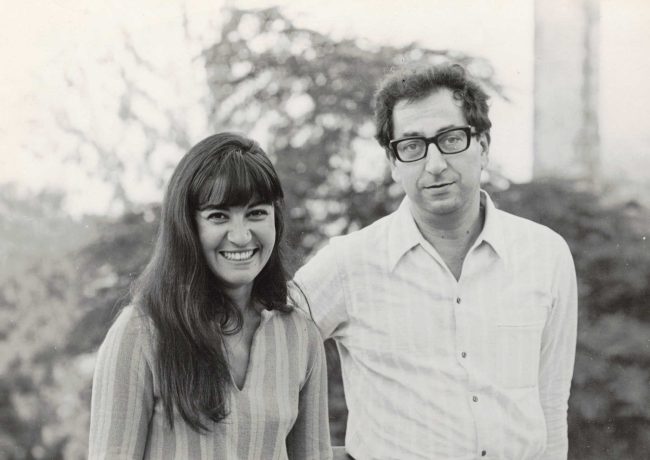
He couldn’t take the uprooting from a Lebanon he’d loved, a Lebanon that had made his and my mother’s fame and romance (they were fiercely, angrily in love these two), a way of life he could not do without. “I went to America, because you insisted so much,” he wrote her from Paris five weeks before his death. Life there, he wrote, “is far from easy. On the other hand, it’ll take more than three years for the children to adapt to an American ‘campus’ mentality, to the language, to the manners. Then it’ll immediately be time for college, each one will go his own way, and not next door, one will go to Houston, the other to Virginia etc… and us, very quickly, you and me, we’ll be alone at some far end of the USA.”
I don’t mean to paint an overly tragic picture. He died. We — my mother, my two brothers and I — didn’t. We retreated to the relative safety of our summer home away from the ravages of Beirut. We learned to duck and lay flat at the sound of whistling shells. We had fun grand-parents. We went to school more on than off, and had, despite the war, a blast. My mother for 15 years had been one of Lebanon’s famous TV personalities, hosting a live kids’ variety show, a radio show and writing a lifestyle page a week in Lebanon’s French daily. TV was out. The station was within sling-shot range of a Palestinian camp that double-bunked guerillas and refugees. Her newspaper and radio gigs continued, and she let me skip school to be with her for marquee interviews. Neither of us knew it then but she was enabling my lifelong disorder as a reporter. She profiled the big-wigs of the day — most of them mobsters and militia leaders with self-aggrandizing government or military titles, the type of people who did not tolerate tough questions unless the questioner was willing to end up headless in a ditch a few days later.
More novelist than journalist, and profiting from her minor celebrity status, my mother stuck to the psychological profile. Rather than infuriate her interview subjects–or risk her life–she’d frame hints and allusions in flattery and let readers infer the rest. She sometimes hosted dinner parties for the mobsters at our home. Men who would otherwise not officially speak to each other would end up sharing mother’s goulash around our dining room table. Bodyguards holed up in the kitchen outnumbered guests, for good reason. Several of the guests were eventually assassinated or exiled, including her bosses at the newspaper and the radio station — the Gemeyel brothers, Amin and Bashir, both of whom were quote-unquote elected president but only one of whom lived to serve out his term before enjoying his Parisian exile.
But three teen-age boys in the Lebanon of the mid-1970s were militia-bait. My mother worried that we’d eventually be drafted, as many boys were. The Phalangists’ militia–vaguely modeled on the Hitler Youth after Pierre Gemeyel visited Nazi Germany in 1936 as captain of the Lebanese Olympic team–was already conscripting my older brother into weekend “training” alongside the usual scum and riffraf that make up any and all militias. I say this entirely aware that without the Phalangists right about then most of us would have been massacred, but also convinced that without Christian nationalism’s chip on its shoulder for the preceding decades, Lebanon’s Christians and Muslims might have carried on more cohesively, as they had for centuries even before the Crusades. Lebanon’s Christian Maronites spread in the mountains in the 5th century, Muslims in the 7th. But for a few mutual massacres here and there and the civil war of 1860 between Christians and Druze, cohabitation was the rule. But there’s no place on earth where Christian nationalism’s sign of the Cross has been distinguishable from the swastika. Lebanon–my Lebanon, my Christian upbringing–was Exhibit A.
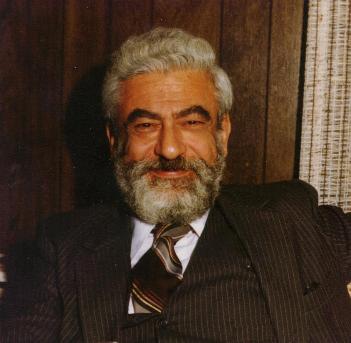
My mother wanted us out of there, and shipped out my two older brothers first, sending them to boarding school in England in January 1977. We were lucky. We had what most Lebanese by then didn’t have — the proverbial rich American uncle. Ours was a pathologist who’d never married and had plenty of money to bankroll the hard-up family back home. Oncle Michel to everyone. That’s who my father had been visiting in Lubbock. Three years into the war he paid for our escape, my mother and I. I’m not using the word lightly. That July in 1979 Syria had joined the fight on Palestinians’ side. We were in a state of siege again. For the first two weeks of the month the Syrian army blindly shelled Christian civilian zones, as if Gen. Curtis LeMay had come out of retirement on Syria’s side.
Then we had a lull. The last night I spent on Lebanese soil we were back in Beirut, in an apartment owned by one of the Gemeyel family members we’d long known before the war and who’d taken us under his wing. We were within blocks of the Murr Tower, the city’s tallest high-rise, an ugly, unfinished concrete hulk that came to be known as the Tower of Bitterness. It remains unfinished today, and was recently conceptualized as a 23,000-vault cemetery by a graduate student. Back then it was spiked with the muzzles of Syrian howitzers using the heights to pound Christian East Beirut. The bedroom I spent my last night in had a window with a direct line of sight to the tower and one of its guns.
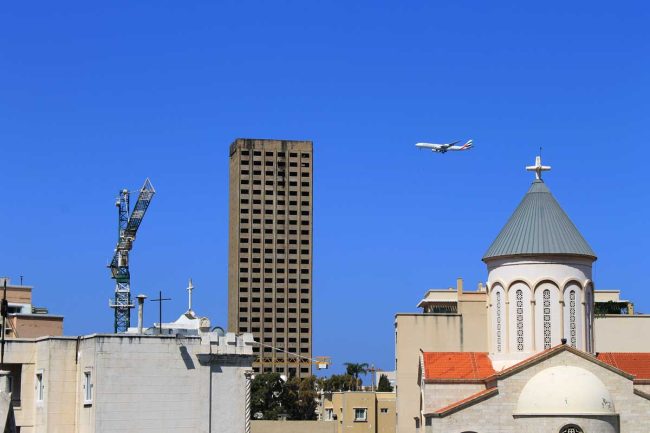
The next morning we had to make it to Beirut International, at the south end of the city, crossing Muslim West Beirut and a parade of hostile roadblocks–PLO, Muslim leftists, Syrian. My mother and I were at the mercy of a Muslim driver our Gemeyel protector had hired, one of those amateur double-agents with a taxi who knew where to zigzag to avoid roadblocks, or what to say if we were stopped at an unfriendly crossing.
We drove through a part of the city I had not seen in three years, the part where my parents used to take us for movies and pizzas and the beach and shopping at Spinneys, an IKEA before IKEA. We crossed the poverty-ridden southern suburbs and zone of Palestinian camps at the edge of the airport–Sabra and Shatila, soon to be the scenes of the worst massacre of the war, by Christian militias and to the light of Israeli flares–the very same zone where a Hezbollah suicide bomber with a smile on his face would plow into the U.S. Marines’ barracks five years later, killing 241.
I was looking and I wasn’t looking as we drove. I had learned fright by rote by then. I was four months away from my 14th birthday, and still I had my head buried in my mother’s lap half the time in back of that taxi as the driver muttered and honked and cursed as Lebanese drivers do even in the best of times. We couldn’t possibly have gone through that expanse of anarchy without running into checkpoints. But the driver knew what to say.
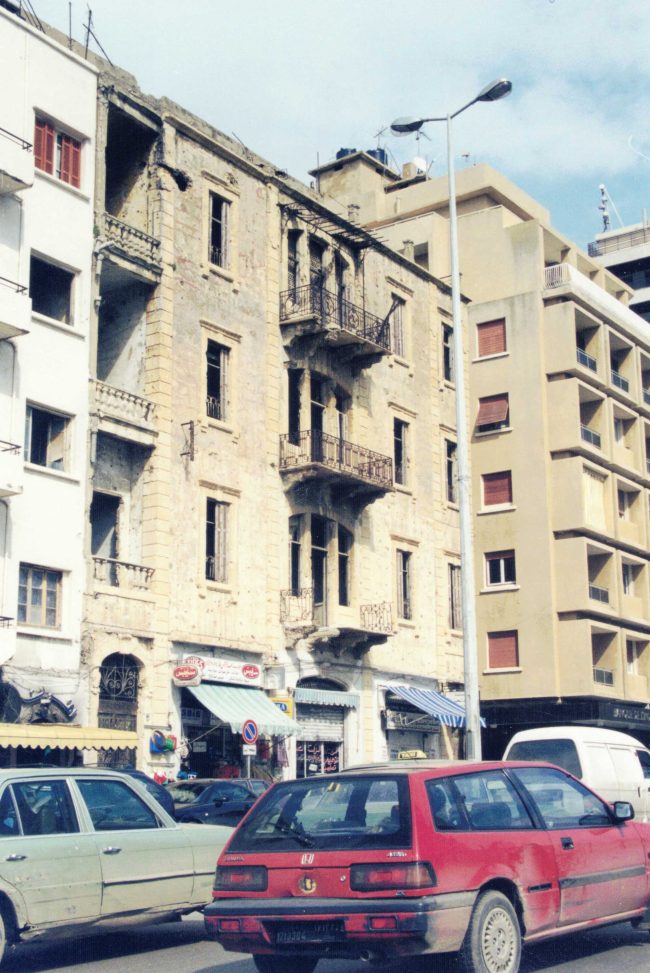
Even now, I wonder at that luck, at the justice and injustice of being spared, at the thought that one moment I am on the lip of one precipice–a car bomb, a sniper’s bullet, a militiaman’s blade–and the next I’m standing on the lip of another–an Appalachian mountaintop, a window atop the World Trade Center, the Grand Canyon–looking at something awesome: not just the sights, but that sense of having gotten away with something. When I got cancer decades later my question couldn’t possibly be why me. It could only be: what took so long?
*
“Look, Ma, civilized grass,” I’d said wryly to my mother as we were landing at Charles de Gaulle Airport in Paris, five hours after the plane soared over Beirut Bay and I saw the city of my birth for the next-to-last time. I had the same reaction in Kingsport, Tenn., where my uncle had moved by then and where we spent the summer as my mother traveled the United States on assignment for her Lebanese paper.
Kingsport was not a particularly enticing introduction to the United States, especially not when the winds blew in a certain direction, dousing the town in the smells of an Eastman Kodak plant. But those were the smells of industry, of a nation at work, not at war. So Kingsport was a magnificent city, as any safe place that wasn’t Lebanon would be to a boy who’d known nothing so vast and free of roadblocks, so organically green. Fatigues had been the dominant vegetation of my last three years. Here it was the green of Appalachian foothills.
Kingsport was an ugly mass of decomposing downtown buildings and lifeless suburban sprawls but its avenues were runways of groomed asphalt or grooved concrete, they were manicured in lush whites and yellows, bordered in bukharas of green. Signage was their decorative art, America’s grandest opus, my first introduction to American literature. I was amazed by the width of its avenues, the way drivers respected the lanes, the fact that there were lanes to respect, white lines, yellow lines, double lines, turning lanes. No one blew a horn. No one ran red lights. Every traffic light worked. Speed limits weren’t merely posted but enforced.
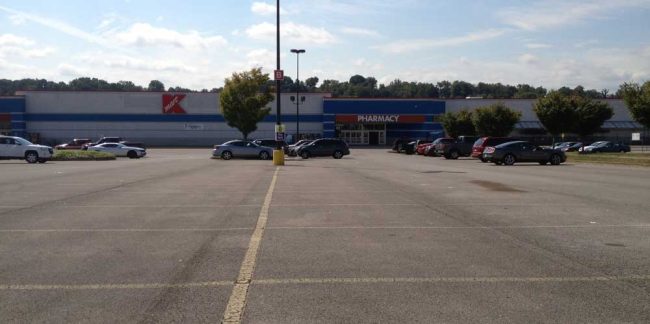
Between the sequencing of the traffic lights and the choreography of cars doing exactly what was expected of them, grid after grid of cars lined up just right, never straddling lanes, sidewalks or medians, between the oblivious calm of what few pedestrians could be seen and the inexplicable rarity of traffic cops, between the being of traffic’s heartbeat and the nothingness it took to keep it going so rhythmically, so perfectly, I found myself day after day longing to be on the roads, driven around by whoever could take me for whatever distance they could spare.
I remember with fondness my first drive-in experience at Wendy’s, girls’ bronzed and near-naked bodies at the municipal pool near Dobyns-Bennett High School, where we hung out every day, Jerry Rafferty’s “Baker Street” playing somewhere every half hour and hourly newsbreaks that, unlike the cataclysmic nine minutes we heard about our own lives in Lebanon on the hour every hour from BBC World Service, passed off the most ridiculously pointless information about city councils and county commissions and baseball and celebrities as “news.” I was in playland. It was the summer of my first Coke on tap, my first kiss, my first trips to Montgomery Ward and Kroger, my unhealthy, emerging adolescent fetish for Interstates I may not have entirely shaken, though I would not learn to drive until I was 22.
A child doesn’t lose his homeland and forget it no matter how miraculous the road ahead. I missed Lebanon, broke down uncontrollably once and demanded that I be sent back, though maybe it was more from fear of spending a year in boarding school in England, Englishless and motherless, than out of affection for what was by then a daily butchery. People were shot with anti-aircraft guns, children were decapitated, whole villages were massacred. I didn’t exactly have a choice. I joined my brothers in England. I put up with the snot-nosed cruelties of English boys, who so enjoyed the fact that I couldn’t speak their language, but by Christmas that year I could say “fuck off” to the best of them and by spring could write my own English Letters. I had to: My mother had met an American journalist on her American trails, she had married him, and together they were repatriating us all under one roof, a family again, in New York City in the summer of 1979.
New life, new country, new dad. Only in America, as they say. And the new dad wasn’t the intolerable step-sort. He was every fiber an American, and better yet, a newsman who let me spend my adolescence in his television newsroom, albeit the television sort. There he was at John Kennedy Airport the day I landed back from England, Green Card in hand, a “resident alien” of a nation I had dreamily traveled so many times by finger on the National Geographic maps spread on the living room carpet back in Lebanon. I landed on July 19, 1979, a year to the day after I had left Lebanon, three years to the day after my father’s death.
I am not big on providence or cosmic coincidences. This one is an exception.
*
It would be nice to think that the day I arrived in the United States I fell in love with it. It wasn’t immediately the case. Immigrants become American with time, if they do. Many die still broken-hearted for the old country, their American adoption a convenience or a filial sacrifice. Many are crushed by the prospect of making it here. My father wasn’t wrong about what he feared of the United States.
But in 1979 I had everything going my way. I was 14 and adaptable when I arrived, I had an American father to ease the transition, not to mention pay the bills of choice schools. His affection for New York proved transferable so that I am now more fond of some parts of the New York subway than I am of most memories of Lebanon. Commuting through the city’s tunnels for seven years without once being mugged, in those days of prime crime also helped. By the time I raised my right hand to take the oath of citizenship in a Brooklyn courthouse, on a cool December day in 1986, I imagined I had shed Lebanon willfully and entirely. I had shed my Catholicism, my mother tongue, had even shed my father’s name to create my own. I considered myself, happily and without reserve, finally, an American. No illusions why: Lebanon had taken away. America had given. It seemed as simple as that, though of course it never is.
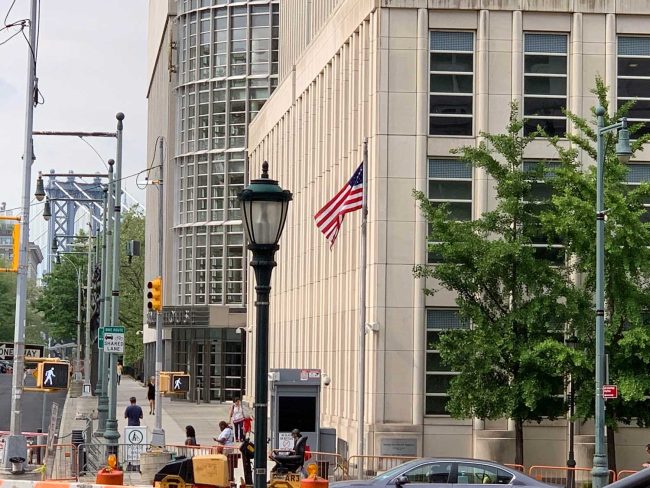
I can say with sincere sappiness: I love this country with all my heart. There is no other place I’d rather be, and as you’ll read in subsequent chapters, I get strangely anxious when I’m away from it for too long. At the same time I don’t mean to hoist hymnal flags to the republic. Love of country to me should be mostly private and modest, or at least expressed in more personal, more meaningful ways than Pavlovian ceremonies. Loud patriotism gives me the creeps, especially in group settings.
I love the beauty of the words and rhythms of the Pledge of Allegiance and its socialist inspiration. But I can’t bring myself to recite it publicly, especially with its 1954 corruption. This may sound absurd to you, even offensive, and I completely understand, though maybe you can begin to understand my discomfort if you’ve read this far: I can’t shake the echoes between the Pledge of Allegiance, militiamen’s oaths to “God, Homeland, Family” and the Nazi salute. We once believed and recited those oaths in Lebanon, under threat, even as the oath-keepers blasphemed God, demolished the homeland and massacred families.
We believed because we didn’t question. Submission is often confused with patriotism, or faith for that matter, when it is the first step to complicity in the indefensible. Lebanon’s demise had a lot to do with blind acceptance of monochromatic ideologies that reduced allegiances to slogans the way they reduced human beings to good and evil, worthy of life and not worthy. There was nothing in between, not even allowable silence. Shouts drowned out reason, and when the shouts weren’t enough anymore, blades and guns did.
My silence today is not against the Pledge. It is merely in mourning for a silence not respected enough. The United States isn’t immune to that slippery slope. It’s the country of extremes, and these days it feels as if we are losing our balance. Our extremes had always been tempered by a reverence for law and a healthy, grudging faith in government. That balance kept the American experiment alive, and on the whole, successful. It kept us immigrants coming. I’m not sure the balance is quite balanced these days.
Even in 1998, when I was setting out on this journey across the country, the version I wrote for the newspaper at the time described how loud American patriotism was, and how smug it had become. Experimenting was out, self-satisfaction was in. Politics even then was mostly about choreographed insults, television a boom-box of shout-shows and scandal. Imagining a golden age is the bane of American perspective. But there really is not much difference between the America of Newt Gingrich and Donald Trump. Only the volume has gotten louder, the filters and inhibitions less pronounced, thanks to social media. Government had become the enemy since Ronald Reagan’s first campaign in 1976. Compromise by the 1990s was considered dull, virtue a partisan weapon. The nation’s fabric was fraying.
The 1960s marches on Washington were about inclusion and hope. By the booming 1990s they’d become about exclusion and fear. Each new march was a circle of wagons, its self-contained million Black men or white Christians or multicolor gays and lesbians grumbling at the world instead of mingling with it, if often for good reason. Hyphenated Americans were everywhere. Walls, too. Gated communities were segregating the suburban landscape even more than mausoleum-like subdivisions. So were ads that gloried SUVs to navigate the guerilla neighborhoods of our cities. We were going down an ugly road then, though again: I prefer resisting the snares of golden age nostalgia. The country is changing, as it always has, as it always must. It’s not going well, and in some ways, as Edward Luttwak warned in the 1990s (he predicted Donald Trump in 1994), we’re becoming a second-rate nation with increasingly fascist tendencies. But I don’t know that we can say that it’s getting only worse after the first Black presidency, the legalization of gay marriage, the widest democratization of speech in history, the lowest level of poverty in our history.
*
I returned to visit JFK Airport on the 19th anniversary of landing there with my Green Card. It had become the sort of third-world quality airport Luttwak complained about, where “the chronic disorganization of perfectly routine procedures” reigned. The New York Times panned its “well-earned reputation as one of the least hospitable of the world’s transportation hubs.” The lipstick on that pick were yellow and gold banners and pennants all over roads and buildings celebrating the airport’s 50th anniversary. “Welcome To JFK Where America Greets the World,” one banner proclaimed. It may be the new Ellis Island, but in today’s JFK there are as many No Entry signs as there are barriers, steel-secured doors and forbidding security guards whose job is to ensure that only certain people cross certain lines. International greetings in the age of globalization and falling borders have become more, not less, guarded.
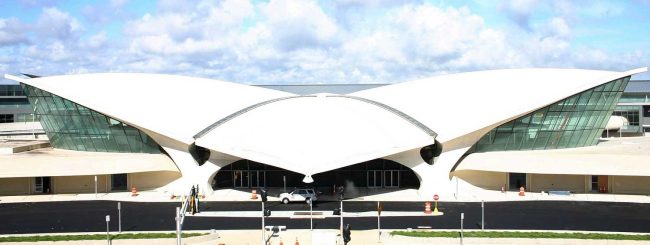
Walking around the terminal where I had landed, I found Emma Lazarus’s famous words: “Give me your tired, your poor, your huddled masses yearning to be free.” The words were inscribed in yellow letters on a black marble wall that hadn’t been polished in a long time, or so it looked from behind the bullet-proof pane beyond which I wasn’t allowed.
Miss Liberty’s words are out of the way. The shops aren’t. The terminal was being refurbished the way of every neighborhood sprawl so that by 2001, a sign proclaimed, the 1.5 million square-foot “light-filled terminal” would include a “100,000 square-foot magnificent retail hall, which will include food courts, restaurants, duty-free shopping and a wide variety of special stores.”
When President Truman had dedicated the airport in 1948, back when it was more poetically called Idlewild, he saw the place as “the front door for the United Nations” headquartered in New York. “Men and women from the far corners of the earth will land here in their search for peaceful solutions to their countries’ difficulties.” When the airport was rededicated as John Kennedy Airport in December 1963, barely four weeks after the president’s assassination, New Jersey Gov. Richard Hughes said it created a “perpetual message to those millions who will pass through this threshold to a great land.” When the international terminal’s $10.3 billion redevelopment was yet again re-dedicated in May 2001–the day police in an Arizona border town uncovered the deaths of 14 migrants abandoned in the desert by smugglers–Lewis Eisenberg, the chairman of the Port Authority of New York and New Jersey, which runs the airport, hailed baggage carousels that can handle 3,200 passengers per hour and “first-rate restaurants and shops.” If luggage wasn’t getting lost, American idealism was.
I don’t mean to be gloomy. Unlike most trips to airports, my day at JFK was almost exhilarating. Truman’s hopes for the airport as a doorway to diplomatic peacemongers may not have come true, but that may be because the real United Nations is not located in that dirty-green, anorexic building on Manhattan’s East River but in the city, and to a lesser extent across the nation that surrounds it. Eavesdropping while sitting at JFK’s Starbucks was like tapping into an international phone exchange. There was a time when the languages heard in airports were limited to French, German, Dutch, Portuguese — the voices of the old colonists then traveling the world in search of lost glory.
The voices you hear now are Malay, Arabic, Hindi, Korean, Hausa, Swahili, Chinese. The colonized have become the new colonists, converging on America in their sarongs and dreadlocks and chadors to mix with cut-off jeans and yarmulkes and midriff shirts. Most of the new colonists would always remember their first day in the States, their first hours at JFK.
I knew by then that I would be traveling across the country, and I wanted to begin at my Plymouth Rock, retailed and barricaded as it was. When I became American in 1986 I’d pledged to myself that I would one day travel the country, walking and breathing every state — not as a sight-seer or even a seeker–I don’t see the need to search for what’s already there–but as an observer. I didn’t know when or how that journey would take place, only that it would.
Immigrants like to journey back through their genealogy and return to the land of their ancestors. I was reversing the flow. I wanted to journey out from my past into the land I’d chosen to be mine and immerse myself in its multi-meridian moods. I would draw a personal portrait of the nation, my landmarks in every state made of impressions, not monuments, my aim to fill in an immigrant’s cultural genealogy. Muslims have their hajj. This would be mine. The pilgrimage across my 50 Meccas would at most be a modest fulfillment of my citizenship, but without pretending to be telling this country’s story. That would be diminishing it. And I have neither the skills nor the imagination.
“There are too many realities,” John Steinbeck wrote in his Travels with Charlie. “What I set down here is true until someone else passes that way and rearranges the world in his own style. For this reason I cannot commend this account as an America that you will find.” What follows is the America that I found — as untidy, as contradictory, as excessive as was my gratefulness to have found it.
![]()
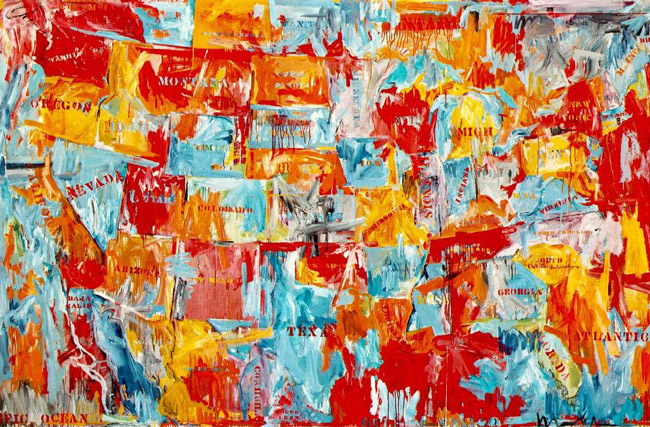





























Teresa says
We are fortunate you settled in Palm Coast. Looking forward to reading more of your travels.
Kat says
Thank you for letting us experience how you began your journey. I am looking forward to the next chapter.
JEK says
Thank you Pierre.
Apple Pie Guy says
Stop. ENOUGH….. Your not Gunga Den nor are you Captain America Imported. Your just another immigrant from a crap hole country who never served in America’s military so you can not appreciate American Patriotism. Why not go back to Lebanon and write your fellow countrymen about your child hood.
You have NO IDEA what being a TRUE AMERICAN is. And I don’t think you ever will.
The dude says
I’m thinking it’s YOU who has no idea what it is to be an “TRUE AMERICAN” with your white supremacy appropriated, and bastardized, version of what constitutes “American patriotism”, and clearly you never will… so please sit down and STFU.
marlee says
Very weird name chosen by…Apple Pie Guy!
His caustic, bitter, angry and vitriol comment does not sound like….
American Apple pie!
It makes me sick that someone would reply that way.
bob says
A wart hog has a better presence than this burnt pie
Patriot of the Pen says
Dear Apple Pie Guy unless you are Native American, your ancestors likely came to America (as mine did in the 1600’s) with their tail between their legs from some shit hole country. It would be interesting to know your own lineage to claim your exclusive right to judge patriotism and tell a fellow citizen to go back to where they came from. I, for one, look forward to more in this series from Pierre because unless I am mistaken he is setting the stage with his own childhood experiences here to warn us all of the precarious slide our democracy is in and how fragile all nations are when factions push beyond certain limits. I cannot think of any more noble and patriotic endeavor.
In fact I am of the view that the best and most preferable guardian of democracy and of civil rule is the pen. I far prefer it to the mob rule of January 6th which is exactly the insight I believe Pierre is transmitting.
Call me Ishmael says
What an ignorant piece of shit the military turned out when they trained you.
Old Guy says
As a US Military Veteran I resent your implication that only veterans can be true patriots. Less than 1% of the population have served and those that have should be thanked for helping to preserve your right to espouse such a bigoted opinion. Your Welcome.
bob says
Apple pie, it’s you’re not your (education) … I served and am patriotic, not a horn honking radical thinking breaking glass at the US Capitol is patriotic … I am a true American with a purple hearted father & brother, not a bar stool sitter thinking such action makes or gives beneficial ideas
Pat Stote says
What a terrible thing to say to Pierre. You should be ashamed. Just remember our previous president never served a day in the military and seemed proud of it.
Laurel says
Pat Stote: Not to mention that he said “I don’t like people who get captured” referring to John McCain, a real war hero and true American.
jake says
Just a note, the current President has “never served a day in the military” either. As many as a third of the Presidents did not serve, nor is it a requirement, however, maybe it should be.
Roy Longo says
That has to be the most dumb ass post I have ever seen on FlaglerLive and that’s saying something. I served my country but that doesn’t make me anymore patriotic than those who haven’t, with a few exception. Namely those that dodged the draft for bull shit problems like bone spurs. That’s truly un-American. Mr. Tristam did it right. He came to this country AND became a citizen! how about sitting back and enjoying his series about traveling to every state in America. Something you, I am sure, have never done.
Pierre Tristam says
Thankfully, great medics don’t just rescue us from car crashes but from apple pies.
Michael Cocchiola says
Apple Pie, YOU are responsible for America’s slide downward as a beacon of light for immigrants. YOU are helping to destroy the world’s most successful democracy. YOU have helped pollute the American dream. YOU are the prototypical angry American to be despised by all who cross your path. YOU are America’s worst enemy.
Skibum says
What exactly is a “TRUE AMERICAN”??? Oh, you mean a true, true American… a Native American. Ah, now I see. So, Apple Pie Guy, are YOU Native American, were your ancestors Native American, you know… TRUE Americans? If not, it is YOU who needs to stop with the true American bullshit that so many idiots spout after either landing here from another country and then wanting to close the borders to every other person who wishes to immigrate. Or, maybe you have just forgotten your heritage, where YOUR ancestors immigrated from. Because unless you and your ancestors can rightfully claim to be Native Americans, even you, and maybe especially you, cannot spout this absurd idea that you are whatever you believe a “true American” is, so just stop you ignorance already! As for me, I am so very happy that America has been enriched by Pierre and his family, like so many other immigrants who are now American citizens and have brough enormous amounts of talent and patriotism to their newly pledged home. And thank you, Pierre, for sharing your remarkable story with the rest of us, even if Apple Pie Guy is anything but the type of true American who’s views we should respect.
Paul says
The civil war in Lebanon killed over 100,000 people. Pierre fled Lebanon for the freedom of the US. Yet the type of journalism Pierre practices is divisive and reckless. You think he would have learned from what and where he fled to appreciate the US and not be a cause of civil division within a country that allowed him to immigrate to.
Pierre Tristam says
It is precisely because I appreciate the U.S. that I practice the type of journalism I do. We are well on our way to Lebanizing American politics–turning this country into a bunch of tribes with flags, with glorified thugs like Abbott and DeSantis, who have more in common with Lebanese warlords than governors, having no ideology but divisiveness, and who depend on masses of media that now embrace disinformation and the denigration of swaths of human beings (immigrants, minorities, non-heteros, non-Christians). How do you think Lebanon devolved into what it did, Paul? You might need an epiphany down Damascus road so reality knocks you off your mighty high donkey.
Steve Playe says
Every time I look at America from another perspective I learn about my country and about myself. Thank you, Pierre.
Janet Sullivan says
You are the “luckiest reporter on the planet” and we are the luckiest city. So looking forward to future installments. I love the photos (you were quite the handsome boy) and always wondered about your history and your name. Thanks for all of this.
Brian Riehle says
Pierre….I was lucky enough to spend a few days in Beirut in the summer of 1958. It was a beautiful sparkling Mediterranean city, full of friendly welcoming people. It’s been said in recent years that Lebanon was always a wonderful idea, but never a real country.
Pierre Tristam says
Brian, your last line sums it up very well. The summer fo 1958: that suggests you were part of those Marines Eisenhower sent ashore that July to defend the presidency of Camille Chamoun? (He was my maternal grandfather’s second cousin. Not that in Lebanon anyone is everyone’s second cousin.) So thank you: 1958 was the first shockwave, averted in that case.
Ray W. says
Thank you, Mr. Tristam, for your article and your publication. Happy New Year!
If any FlaglerLive reader were to scroll up and reread each of the first four comments to this article, he or she might surmise that everyone’s personality is formed by their unique life experiences. While the English language mostly uses phrases to describe life’s experiences, the German language has a single word to describe it: weltanschauung, which translates loosely into “worldview.” It presupposes that no two individuals are alike, because it is not possible for any two people to have identical life experiences, much less to grow or regress equally by living those experiences.
Can it be argued that the first three commenters have grown from their unique life experiences to be able to appreciate another person’s perspective and, equally plausibly, can it be argued that Apple Pie Guy has regressed from his unique life experiences and is unable to appreciate another person’s perspective?
Is it also plausible to argue that our founding fathers, many of whom intensively studied human nature, hoped to produce men (and women) of virtue by creating a liberal democratic Constitutional republic, but they fully understood that people like Apple Pie Guy would always exist? If that is an accurate understanding of our founding father’s intent, does it also explain why they would insist on inserting checks and balances to every power that was to be delegated to government, so that no one person could ever access unlimited power for an indeterminate period of time? Did they foresee what would happen if anyone like Apple Pie Guy were forever to wield all of the powers that the ratifiers gave away to the government? Were our founding fathers so afraid of people like Apple Pie Guy that they were determined to do whatever it took to keep people like Apple Pie Guy out of power? Did their study of Greek philosophers inform them that vicious and vengeful people would always exist?
As a young son of an elected State Attorney, I soon learned that many people hated my family because my father was a prosecutor. When my father left office and became a defense attorney, I figured out that some of the original haters continued to hate my family and a new crop of haters had emerged to hate my family because my father now defended people. Of course, many people, upon hearing my name, would immediately tell me how much they loved my father.
When I began my career as a prosecutor, I already knew that many people hated me because I had become that part of our government that prosecuted people. When I began practicing as a defense attorney, I also knew that many of the old haters continued to hate me, and that a new crop of haters had joined the throng. And I also met many people who thanked me for what I did, both as a prosecutor and a defense attorney.
Is it ironic that a commenter like Apple Pie Guy would cast himself as American as apple pie, when it is obvious to all that our founding fathers created a country based not upon hatred, but upon hope for the future, albeit an experimental hope? Can a commenter who presents as a person filled with hatred directed toward an immigrant who tells of his love for America ever fulfill the hopeful expectations of our founding fathers? Would it be apropos to recast Apple Pie Guy as Poison Pen Guy?
Please understand that I do not seek to silence Poison Pen Guy. As Jimbo99 recently and erroneously wrote about himself, I am just trying to keep it real. Due to my own weltanschauung, formed by much great advantage in life and also from being the target of much hate, Hegel’s famous philosophical trinity resonated with me when I first heard about it in a lecture. As I understand Hegel, he argued that every newly proposed societal hypothesis (idea) would be met with an immediate societal antithesis (idea) and that the ensuing clash between the hypothesis and the antithesis will produce continual and constant societal synthesis or ideological change. It also resonated with me when I first learned that Freud’s id/superego/ego framework was attributed by Freud himself to Hegel’s trinity, in that the id would forever clash with the superego, producing an ever-changing ego.
My belief, therefore, is that we as a society need to experience commenters like Poison Pen Guy, if only to remind us of what can happen when we allow ourselves to regress from our accumulated life experiences into a perspective of perpetual and irrational hatred of immigrants and others.
I conclude with the repeat of my assertion that our founding fathers were fully aware of the future and inevitable existence of people like Poison Pen Guy. Hence, they took what they perceived as the necessary steps to protect us all from people like Poison Pen Guy. On the other hand, Poison Pen Guy, please keep regressing. Hegel and Freud knew that they would need people like you to continually affirm their life’s work. And keep it coming, Mr. Tristam. Hegel and Freud needed people like you, too. The moral arc of the universe slowly yet inexorably bends towards justice.
Hope springs eternal!
Pierre Tristam says
What is an immigrant but the incarnation of a Hegelian synthesis? Apple Pie Guy likes his theses unchallenged. That’s fine. But it seems dull and pointless, especially–as Ray points out–one of the defining characters of this country (if it can ever be defined, and one of the points of my series is that it mostly cannot, it should not be defined) is its experimental nature. It was founded on an idea, and ideas are not stone: Achieving our country is itself a journey that, with luck, will never reach its destination, because in that destination is the core of Apple Pie Guy’s fundamentalism.
Laurel says
Ray W. and Pierre: And my husband thinks I overthink stuff! :) Actually, I just think that APG is simply Archie Bunker, but less lovable and somehow knows it, and it makes him angry. Our forefathers were probably surrounded by his ilk to the max (even they had slaves), and did consider this while preparing our country’s Constitution. They knew they had to protect balance, even if it offended, to be a true democracy.
Pierre: I love the continuing story, and look forward to each chapter. In my mind, you went from a pretty smart editor, to a multidimensional person. Very interesting!
Michael Cocchiola says
Pierre… this is of the finest personal stories I’ve ever read. While I am appalled by your wartime boyhood experiences, I’m inspired by your courage and optimism as you built a new life and a new love for this foreign land.
I followed Lebanon’s fall into chaos closely. I lived in Washington D.C.’s ‘suburb’ and worked for the Department of Defense. Lebanon’s implosion was our daily news and was much-discussed at work. But it was always far off and our concern was primarily for any impact on Israel’s security. You have just brought Lebonan’s pain to life for me through your eyes. Sometimes horrifying, but amazing nonetheless.
Thought I’d mention that you are your father, for sure. And your mother’s quite beautiful and talented. What a family!
Aj says
Love the pictures. Apple Pie, continue to speak your peace, criticism will always follow. Don’t agree with you but you have a right to speak your peace. Geode criticize me quite often, I’m determined nobody will stop me from speaking my peace. The pictures look great, they really do.
JP says
Piece out?